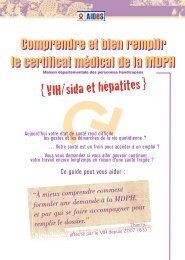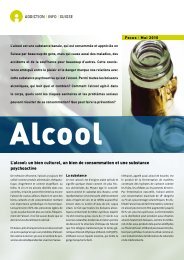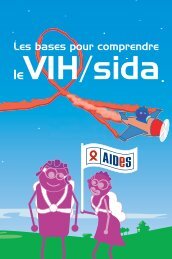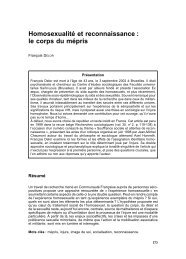Care and support for people living with HIV/AIDS
Care and support for people living with HIV/AIDS
Care and support for people living with HIV/AIDS
Create successful ePaper yourself
Turn your PDF publications into a flip-book with our unique Google optimized e-Paper software.
What makes <strong>people</strong> vulnerable?because rape can result in torn tissue <strong>and</strong> hence create an easy entry-point <strong>for</strong> <strong>HIV</strong>,but because their rapist has a higher risk of being infected. In most countries, <strong>for</strong>example, sexually transmitted infection rates among the military are generally two tofive times greater than those in comparable civilian populations, even in peacetime.In times of conflict, the figures increase dramatically.Sexual abuse of women <strong>and</strong> childrenThe relationship between violence <strong>and</strong> <strong>HIV</strong> is often indirect: the fear of violence makesit more difficult <strong>for</strong> women to refuse unsafe sex. In the case of sexual violence, however,the relationship can be very direct.Like domestic violence, sexual violence directed against women is depressingly commonall over the world, although accurate statistics are few <strong>and</strong> far between. A study ina low-income area of Nairobi, Kenya, illustrates women’s reluctance to report sexual violenceeven when it is extremely common in the community. Some 30% of women agedover 18 said they had been sexually abused, as had one-fifth of teenage girls, but thevast majority took no action. Many said they were too shy – some had been raped by arelative or friend of the family; others considered it would be a waste of time to report.Those that do report abuse are sometimes made to suffer themselves <strong>and</strong> are seldomrewarded by the arrest of the person in question. Of 16 cases of rape reported to police<strong>and</strong>/or the local chief in a six-month period (including two cases of incest <strong>and</strong> two rapesof minors), action was taken in only five cases. Un<strong>for</strong>tunately, police records in Kenyatend to record most violent offences as “assault”, <strong>and</strong> trends are difficult to track.In Botswana, where record-keeping is more thorough, a review of police <strong>and</strong> courtrecords shows a steady rise in reported rape cases (see Figure 19). Many of the rapevictims are very young: over two-fifths of all rape cases that reach the courts involvegirls under the age of 16. In 1997, just a fifth of reported rape cases ended in a conviction,<strong>and</strong> three-quarters of the convicted rapists were given a prison sentence of fouryears or less. Most cases were closed even be<strong>for</strong>e resulting in a criminal prosecution.After lobbying by women’s groups <strong>and</strong> human rights groups, Botswana changed itsrape laws in 1998. The minimum prison sentence <strong>for</strong> those convicted of rape is now 10years <strong>and</strong> rises to 15 years if the rape is committed by someone found to be <strong>HIV</strong>-positive.If it can be shown that the rapist was likely to have known he was <strong>HIV</strong>-infected,the minimum sentence is 20 years.Botswana is not the only country to take decisive action in the face of unacceptablyhigh rates of sexual abuse, especially of young girls. Zimbabwe, <strong>for</strong> example, hasaltered its judicial system to increase the likelihood that perpetrators will be successfullyprosecuted (see Box 10) while also providing abused children <strong>with</strong> services suchas the Family Support Trust. Based at a major hospital in Harare, the Family SupportTrust gives free medical <strong>and</strong> psychological care to girls (<strong>and</strong> more rarely boys) under theage of 16 who have been sexually abused. In 1998, an average of 77 children a monthcame to the clinic. By 1999, as the clinic became better known, the number rose to 9451











